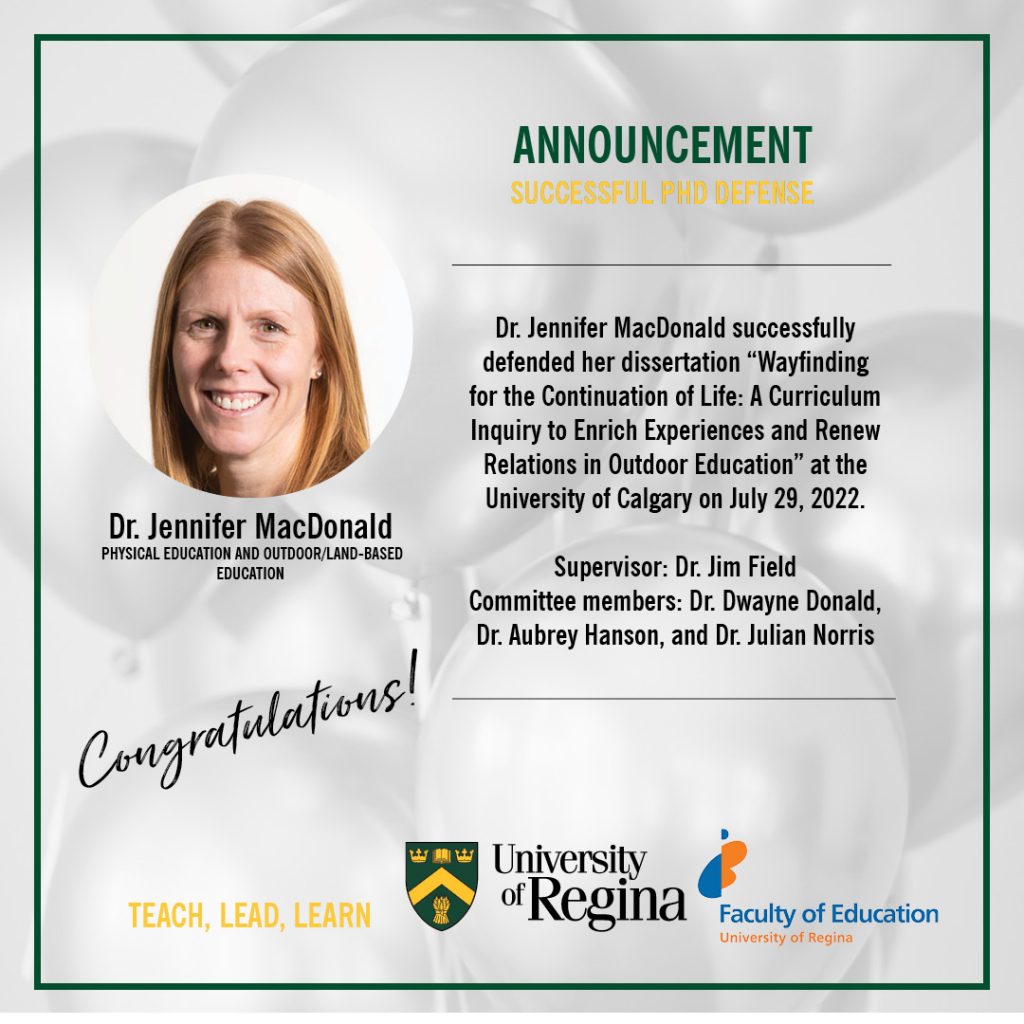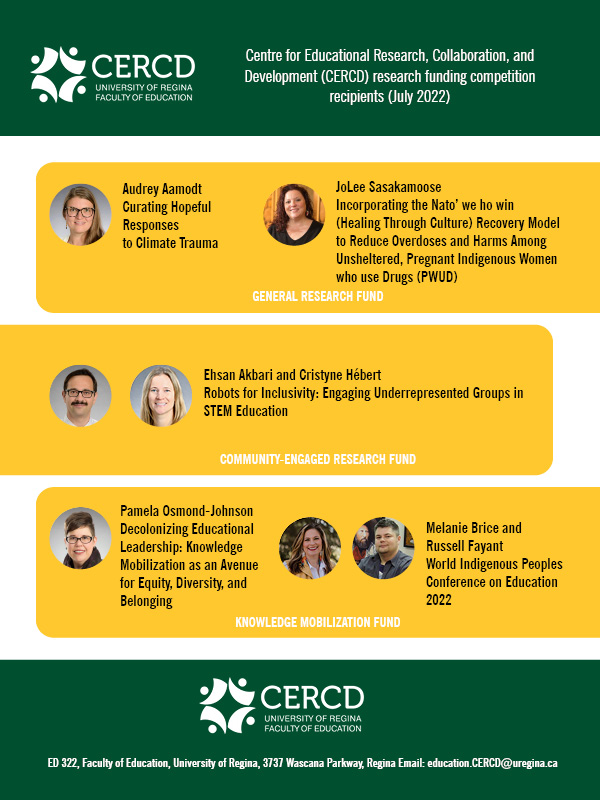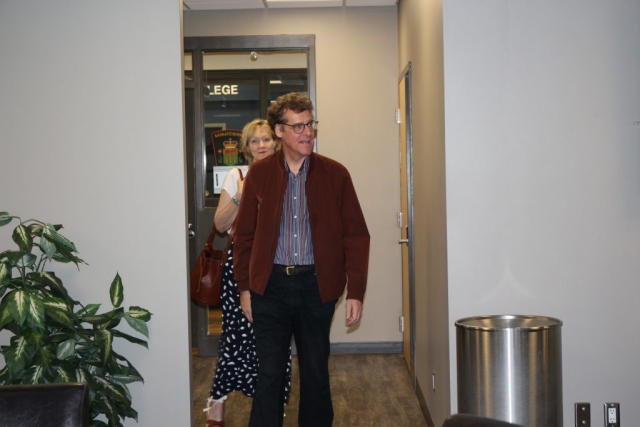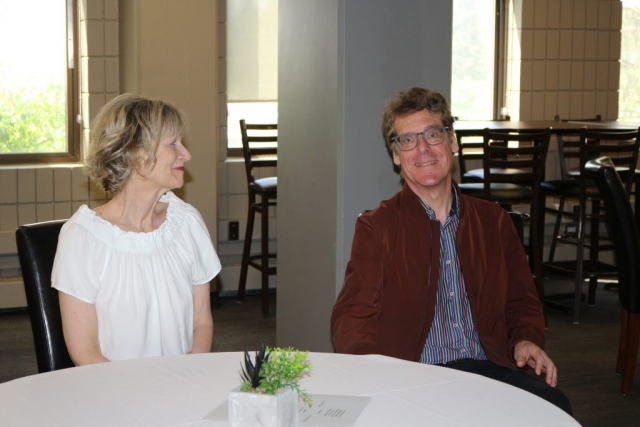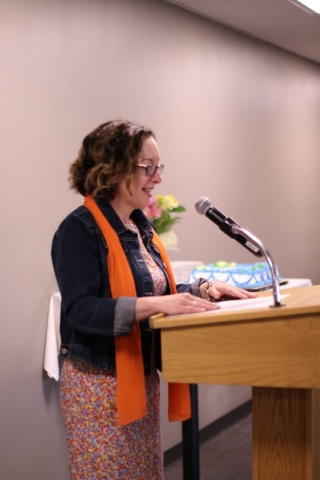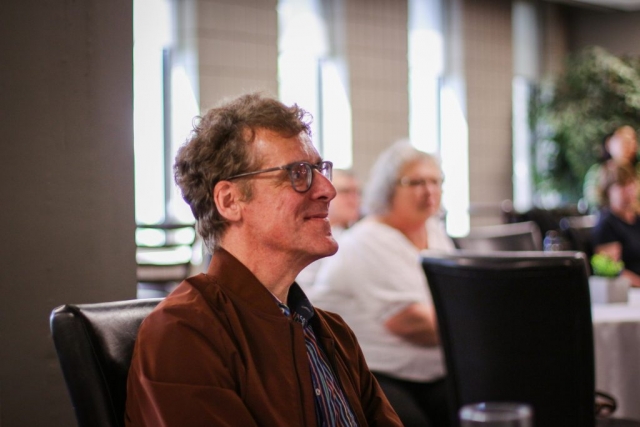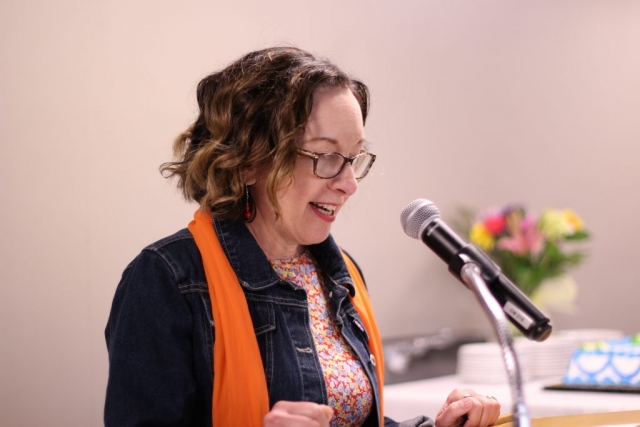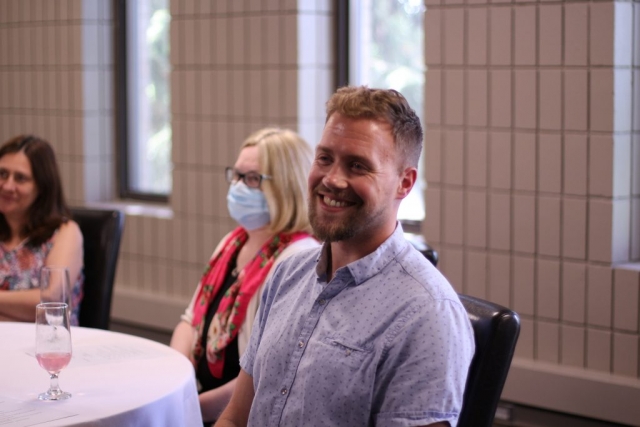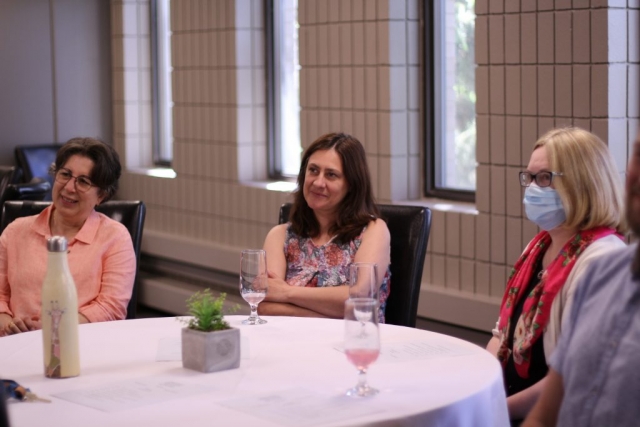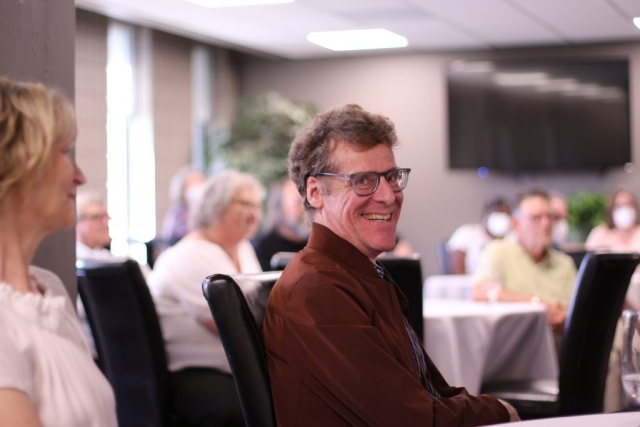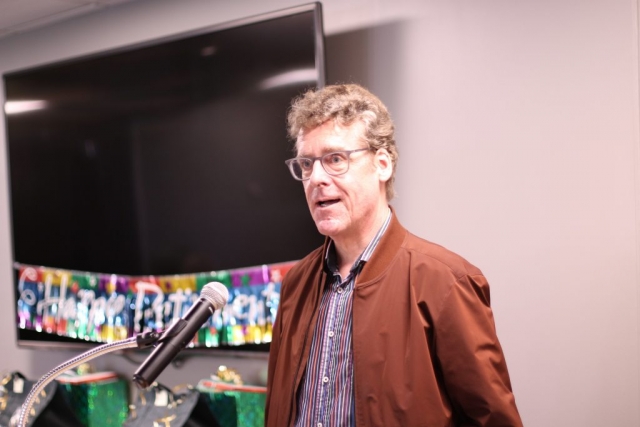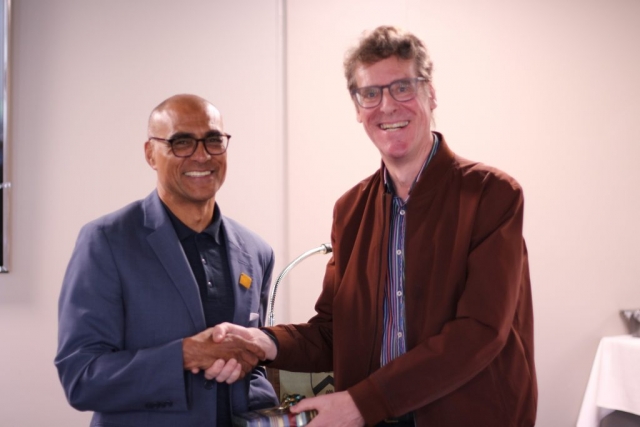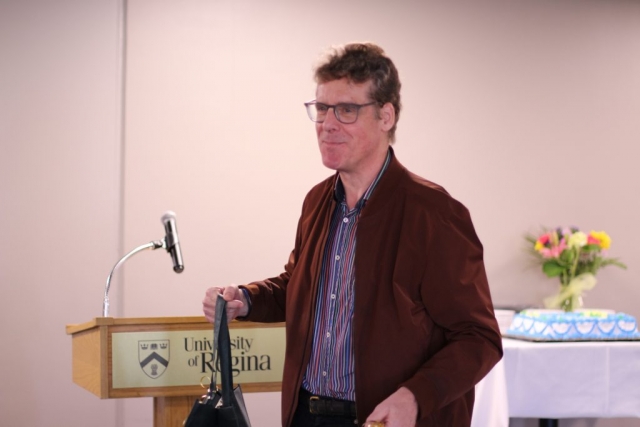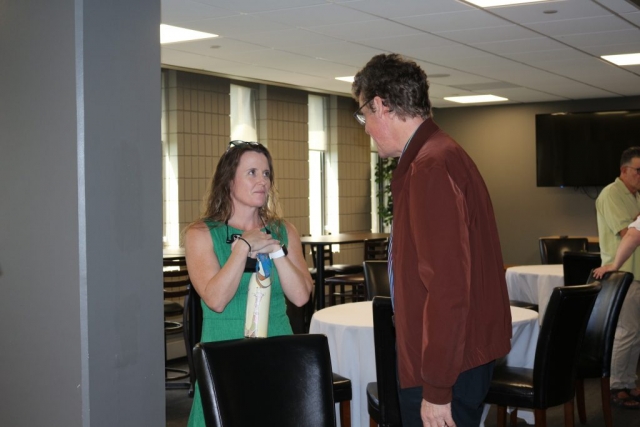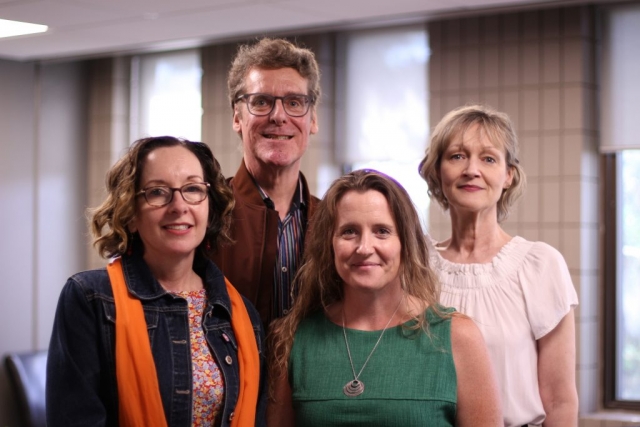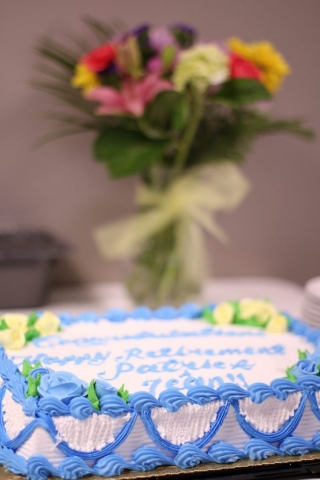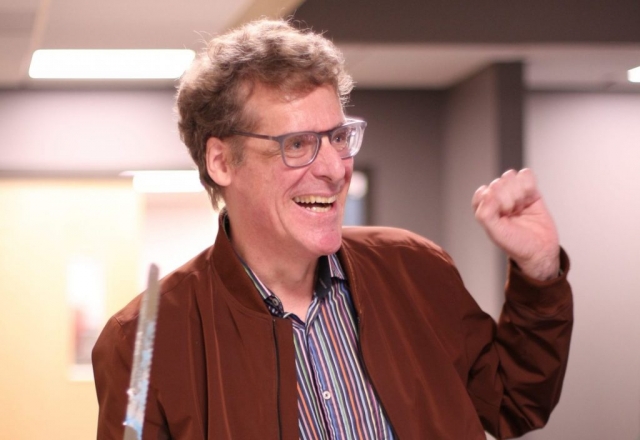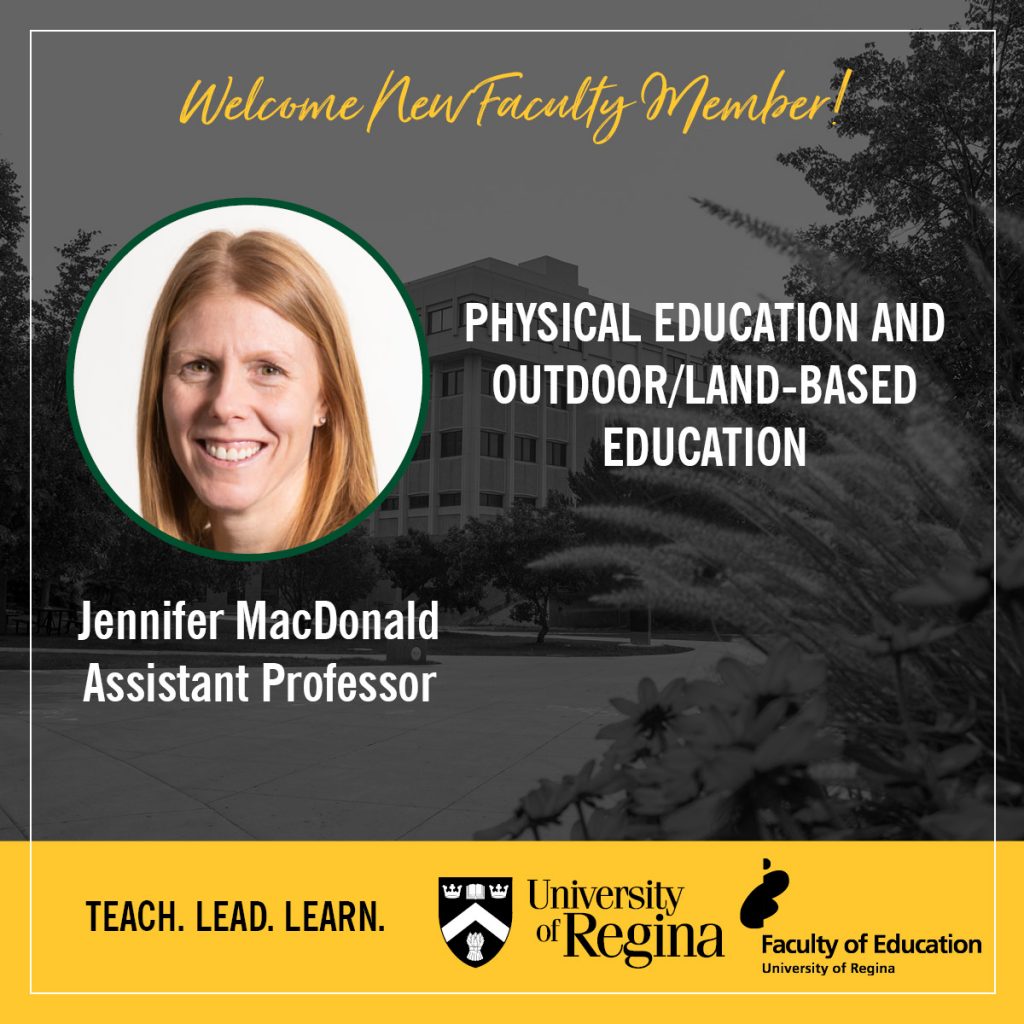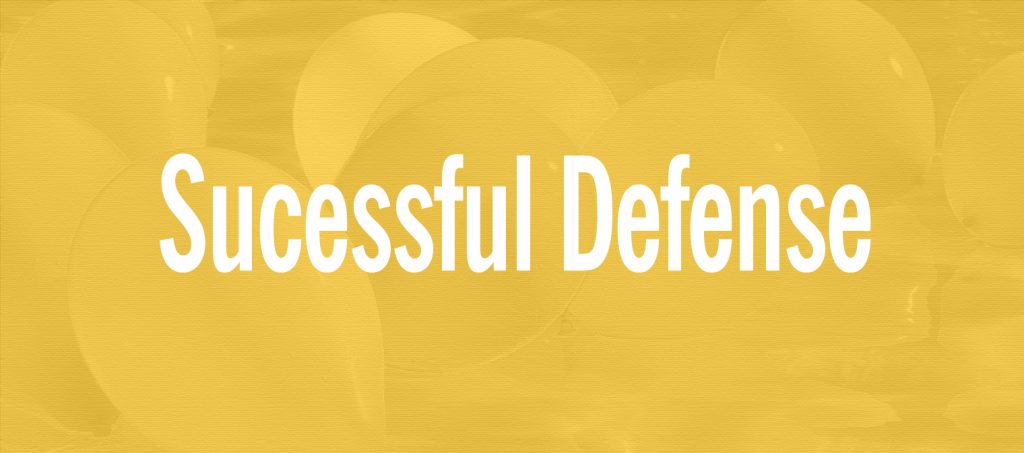
Author: Editor Ed News

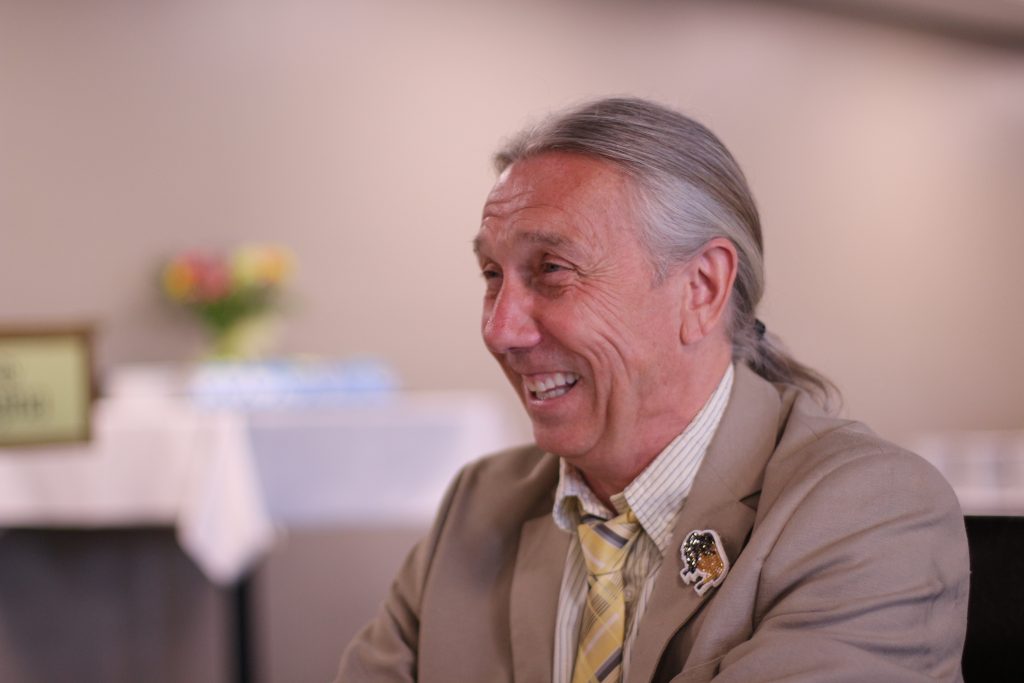
Retirement – Patrick Lewis
Happy Retirement to Dr. Patrick Lewis who retired at the end of June 2022. Dr. Lewis has served in the Faculty of Education in the Early childhood education since 2004. From 2009 to 2018, Dr. Lewis and Dr. Marc Spooner hosted the popular barroom talks, Talkin’ About Schools and Society, which brought in speakers such as Dr. Michael Apple, Dr. Angela Davis, Dr. Zeus Lenardo, and Dr. Patti Lather, to name a few. He also served on multiple committees including the Education Advisory Circle (formerly known as Indigenous Advisory Circle). Lewis served in the role of Associate Dean of Human Resources Development from 2018 – 2021. The Faculty celebrated with Patrick on June 23, 2022.

CERCD research funding – July 2022
General Research Fund:
Audrey Aamodt
Curating hopeful responses to climate trauma
JoLee Sasakamoose
Incorporating the Nato’ we ho win (healing through culture) Recovery Model to reduce overdoses and harms among unsheltered, Pregnant Indigenous Women who use Drugs (PWUD)
Community-engaged Research Fund:
Ehsan Akbari and Cristyne Hébert
Robots for Inclusivity: Engaging underrepresented groups in STEM education.
Knowledge Mobilization Fund:
Pamela Osmond-Johnson
Decolonizing Educational Leadership: Knowledge Mobilization as an Avenue for Equity, Diversity, and Belonging
Melanie Brice and Russell Fayant
World Indigenous Peoples Conference on Education 2022
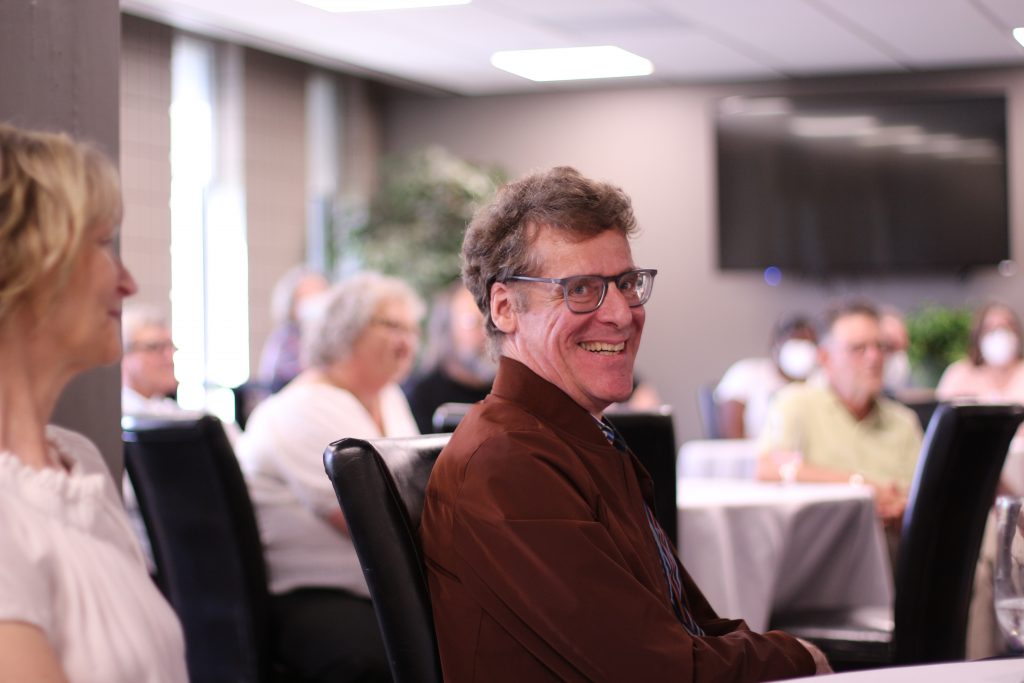
Retirement – Jean Dufresne
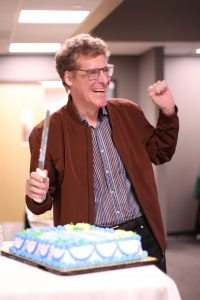 Happy Retirement to Jean Dufresne who retired at the end of June 2022. Jean has served in the Faculty of Education and the le Bac program since his secondment from the Regina Catholic Schools in 2003. In 2017, Jean accepted a position as lecturer in the Bac program and from 2019 to 2022 he served in the role of Directeur of le Bac programme. He has been an outstanding teacher educator and an important member of the Bac team. He is well-respected by colleagues across the University and within the Regina Catholic, Public, and CEF School Divisions. The Faculty celebrated with Jean on June 23, 2022.
Happy Retirement to Jean Dufresne who retired at the end of June 2022. Jean has served in the Faculty of Education and the le Bac program since his secondment from the Regina Catholic Schools in 2003. In 2017, Jean accepted a position as lecturer in the Bac program and from 2019 to 2022 he served in the role of Directeur of le Bac programme. He has been an outstanding teacher educator and an important member of the Bac team. He is well-respected by colleagues across the University and within the Regina Catholic, Public, and CEF School Divisions. The Faculty celebrated with Jean on June 23, 2022.
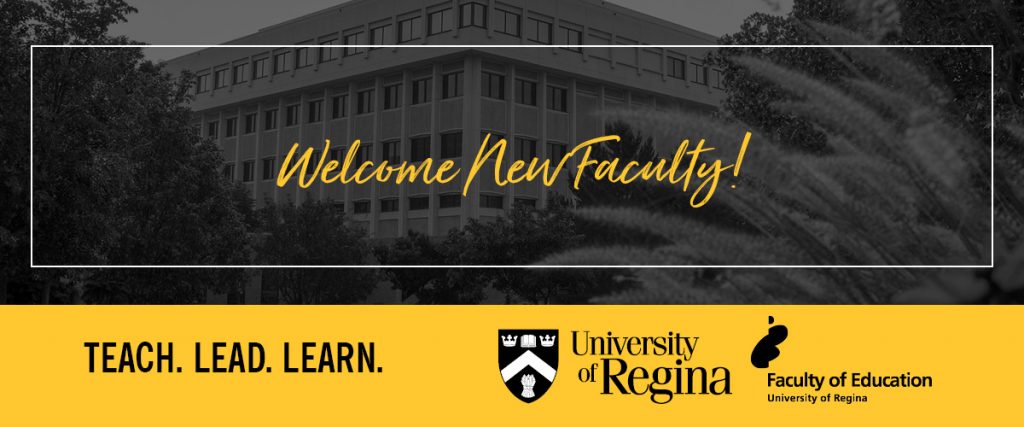
New faculty – Minority language education (Francophone & immersion schools)
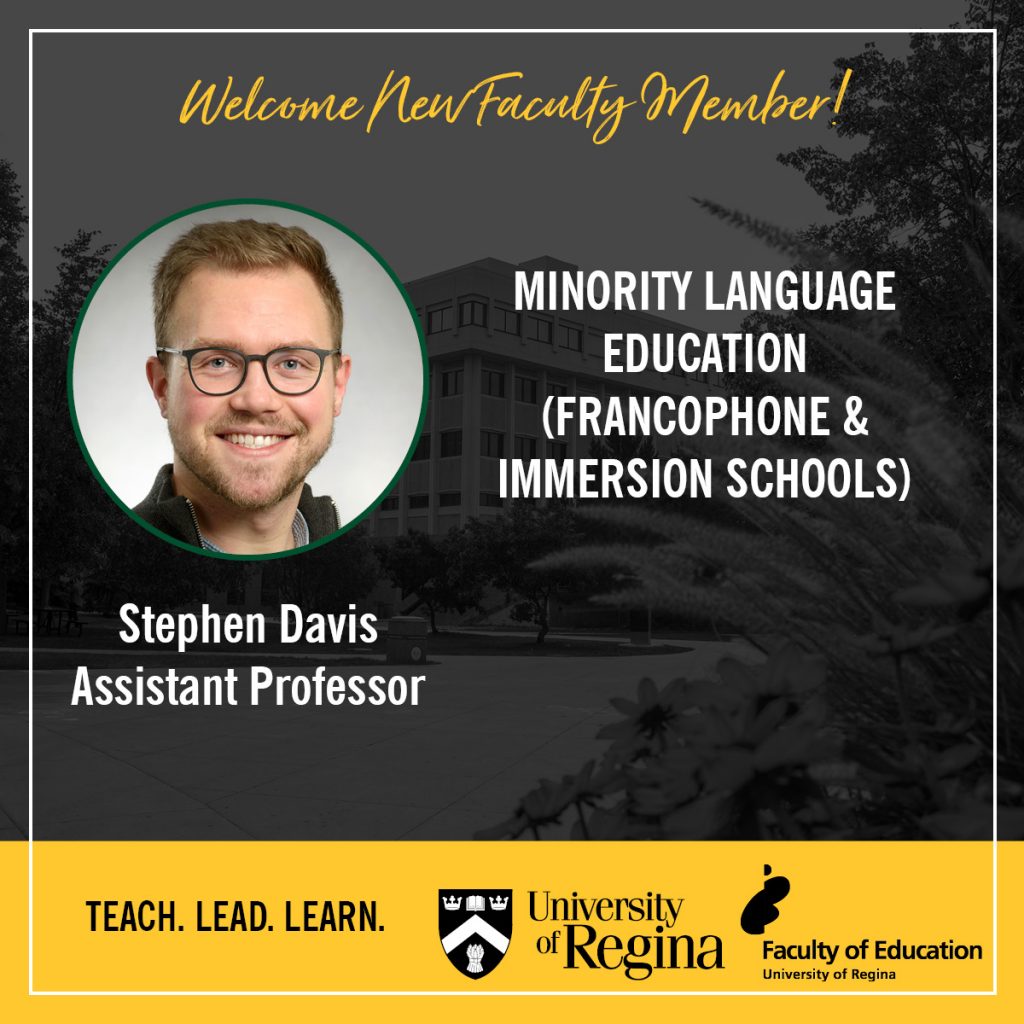 Mr. Stephen Davis accepted the full-time, tenure-track position in Minority Language Education (Francophone & Immersion Schools) (July 1, 2022). Mr. Davis will be nearing completion of his Ph.D. at the University of Regina with an anticipated defense in 2023. Mr. Davis holds a Master’s of Arts in Second Language Education from McGill University, a Baccalauréat en éducation (Distinction) from the University of Regina, and a Bachelor of Arts (Distinction) from the University of Saskatchewan. Mr. Davis’ research contributions broadly explore the perspectives and ideologies of educators with respect to refugee-background students in French immersion programs across the Canadian Prairies. His research examines the experiences of students with learning disabilities in French education, integrating inquiry and advocacy, focusing on equitable and inclusive French education, including newcomer learners and advocating for the inclusion of all learners.
Mr. Stephen Davis accepted the full-time, tenure-track position in Minority Language Education (Francophone & Immersion Schools) (July 1, 2022). Mr. Davis will be nearing completion of his Ph.D. at the University of Regina with an anticipated defense in 2023. Mr. Davis holds a Master’s of Arts in Second Language Education from McGill University, a Baccalauréat en éducation (Distinction) from the University of Regina, and a Bachelor of Arts (Distinction) from the University of Saskatchewan. Mr. Davis’ research contributions broadly explore the perspectives and ideologies of educators with respect to refugee-background students in French immersion programs across the Canadian Prairies. His research examines the experiences of students with learning disabilities in French education, integrating inquiry and advocacy, focusing on equitable and inclusive French education, including newcomer learners and advocating for the inclusion of all learners.

New faculty – Queer studies in education
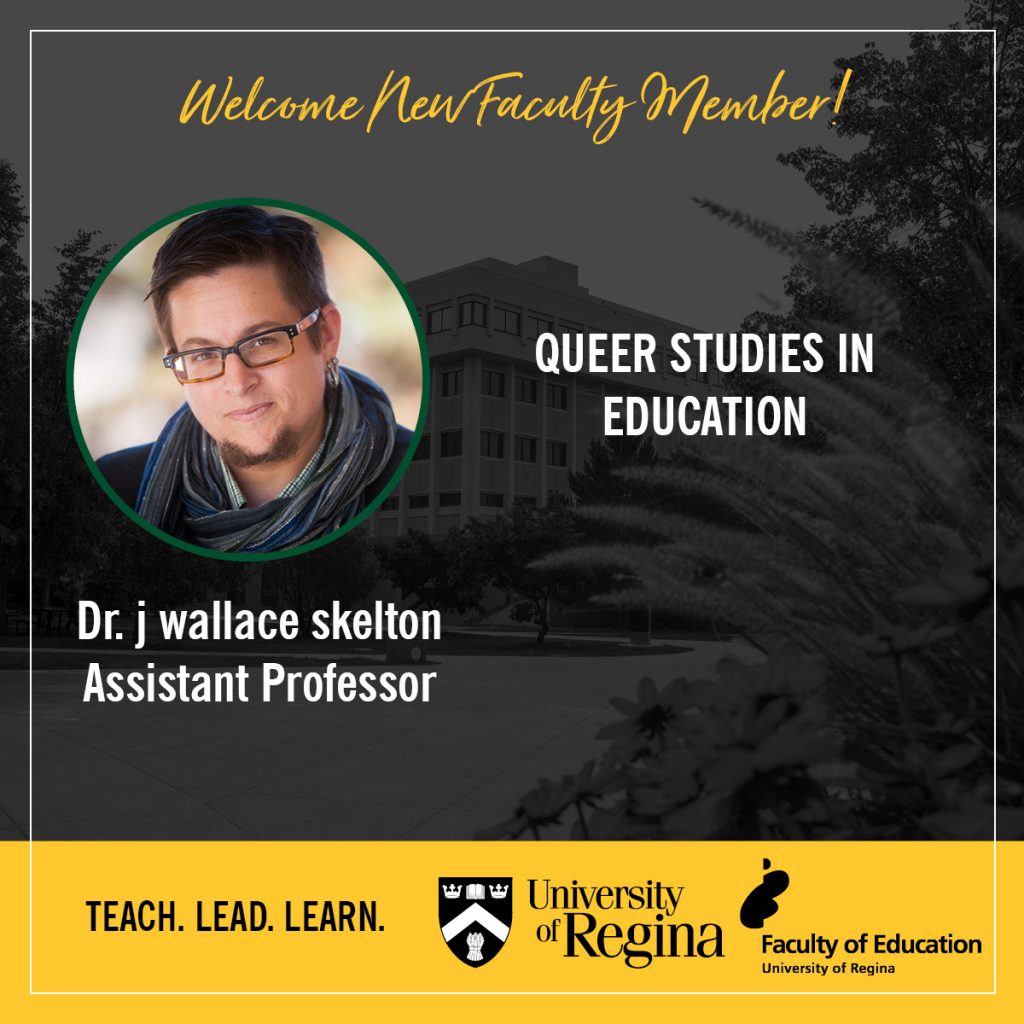
Dr. j wallace skelton accepted the full-time, tenure-track position in Queer Studies in Education (July 1, 2022). Dr. skelton holds a Ph.D. and Master’s of Education from the University of Toronto and a Bachelor of Arts (Honours) from York University. Dr. skelton’s research contributions broadly explore trans theory, queer theory, child agency, co-research with children, community engaged research, research with an ethics of care, trans parents, arts-based research and asset-based research. Dr. skelton has been working in a post-doctorate position at Concordia University and involved in two research projects: a SSHRC-funded post-doctoral project that investigates ways parents are involved in advocacy on behalf of their trans and non-binary children, the needs of parent advocates, and how parent advocate roles shift overtime and an NSERC-funded partnership between Centennial College and Dr. skelton’s publishing company (Flamingo Rampant) entitled “Gender-Affirming, Life-Affirming: Centering Gender Independent, Trans, Non-binary and Intersex Youth in Puberty Education with Adaptive Interactive Media.”

New faculty – Physical education and outdoor/land-based education
Ms. Jennifer MacDonald accepted the full-time, tenure-track position in Physical Education and Outdoor/Land-Based Education (July 1, 2022). Ms. MacDonald is nearing completion of her Ph.D. at the University of Calgary with an anticipated defense in the autumn. She holds a Master’s of Education from the University of Ottawa; a Bachelor of Education from the University of Otago, New Zealand; and a Bachelor of Physical Education (Honours) from Brock University. Ms. MacDonald’s research contributions broadly explore social change, ecological healing, and truth and reconciliation. As a researcher and teacher educator she is committed to collaborating with communities, generating new knowledge for planning and teaching in ways that approach place, teaching, learning, relations, wellness, narrative, and curriculum differently. At a time of ecological crisis, her research program provides increased consideration, discussion, and education to help renew co-existence between humans and the natural world while simultaneously contribute to restoring right relations between Indigenous and settler people on this shared land.
Convocation prize recipients
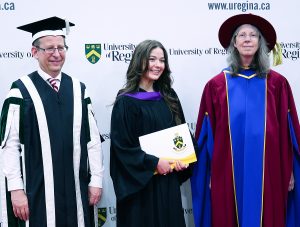
SASKATCHEWAN TEACHERS’ FEDERATION PRIZE
At each University of Regina Convocation ceremony, the Saskatchewan Teacher’s Federation (STF) awards a prize to the most distinguished student of the graduating class in the Faculty of Education who does not hold another degree.
Recipient: Brittney Elizabeth Leitner, Bachelor of Education in Arts Education with Great Distinction
Over the course of Brittney’s degree, she was the recipient of 15 scholarships and awards, most notably the Academic Silver Scholarship (2020 Fall), the UR Guarantee Leadership Award (2020 Winter), and the Margaret Messer Undergraduate Scholarship in Arts Education (2021 Fall). Brittney completed her degree with an overall average of 91.14%. Her passion for the arts, teaching, and social justice led her into Arts Education and inspires her to create inclusive and creative learning environments for every student she is fortunate to meet. During her time at the University of Regina, Brittney enjoyed her work as the President and Founder of the student-lead Arts Education Association and her involvement as the undergraduate student representative on the University Strategic Plan Facilitation Team. Brittney will be continuing her studies in the fall, taking her M.A. in Arts Education at the University of British Columbia.
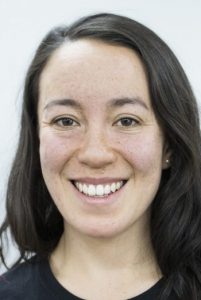
BACHELOR OF EDUCATION AFTER DEGREE CONVOCATION PRIZE
The Bachelor Of Education After Degree (BEAD) Convocation Prize was established by the Faculty of Education to encourage and recognize BEAD students. The BEAD Convocation prize is awarded to the most distinguished graduate, with an overall internship rating of “Outstanding” and the highest grade point average in the program.
Recipient: Emily Keira Nishikawa, Bachelor of Education (YNTEP) with Great Distinction
Emily grew up in Whitehorse, where she especially enjoyed cross country skiing with her family – even going on to represent Canada in two Winter Olympic Games. After retiring from competitive skiing and receiving a degree in Psychology, two primary school teachers influenced Emily’s choice to return to the Yukon where she enrolled in the Bachelor of Education After Degree program with Yukon University. Her personal highlight of the YNTEP program was the outdoor education experience during her practicums and taking her students on multi-day camping trips in the beautiful Yukon wilderness.
Emily was also the recipient of the Academic Gold Scholarship in fall 2021 and completed her degree with an overall average of 94.61%.
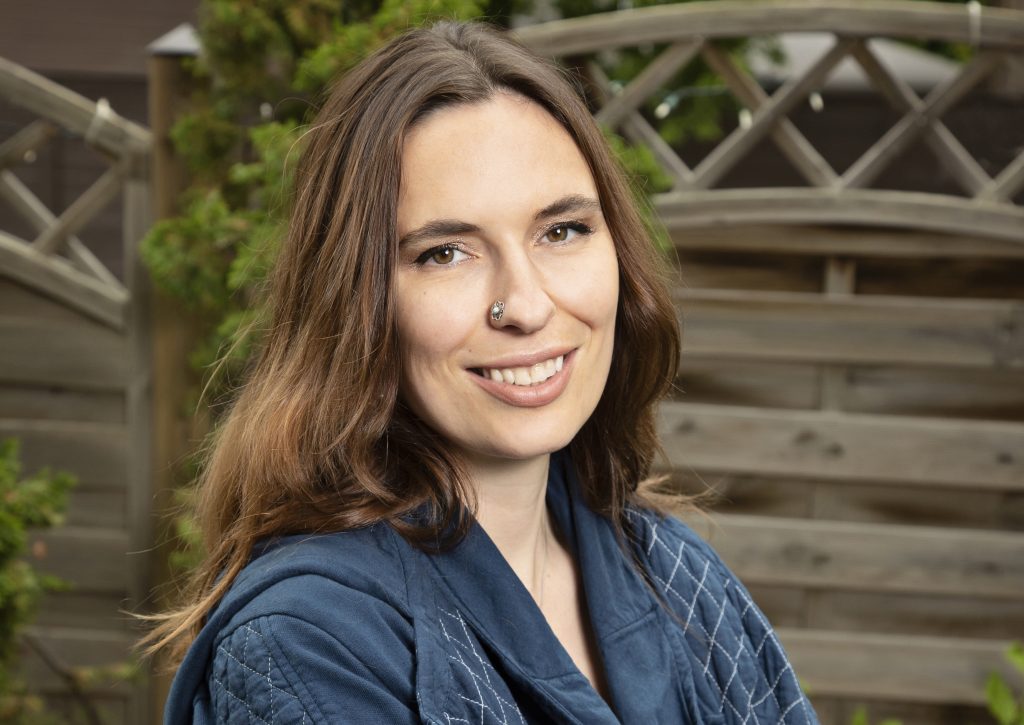
Award-winning master’s student researches immigrant mothers’ experience of their children’s language loss
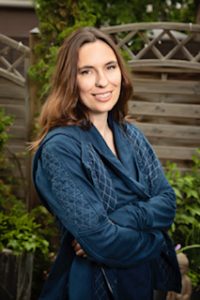
Willow Iorga (MEd’22) was recently awarded one of two Spring 2022 Associate Dean’s Graduate Student Thesis Awards. Willow is currently an Employment Instructor (just promoted to Team Lead of Work Experience and Employer Relations) with the Open Door Society, where she teaches newcomers Canadian workplace skills. She has a BA in geography and an after degree in elementary teacher education, both from the University of Regina. Willow’s award-winning thesis is entitled, “The Immigrant Mother’s Experience of Their Children’s Heritage Language Loss.” What follows is Willow’s research story:
Willow grew up on Pender Island, BC, located off the west coast of Canada, on a 3-acre organic farm/garden. When she was 11, her parents introduced her to world travel, selling their Pender Island property and traveling to Hawaii, New Zealand, Fiji, Japan and Australia. “We backpacked and camped a lot,” says Willow, “Sometimes I liked traveling, but a lot of times I missed my friends back in Canada.” In Australia, Willow experienced a foreign school system. “It was really different, we had to wear uniforms, it was a lot more strict, they taught Japanese instead of French as a second language, and I was really behind in math,” she says.
It wasn’t so much these younger childhood experiences, however, that have given her insights into what it feels like to be a newcomer, informing her current work and research with newcomers. Willow points to living in Quebec in her late 20s as an experience that really helped her feel what it is like not to speak the language of the context in which one lives. “We were living outside of Montreal and no one spoke English and I was in language classes .… In my French classes, I couldn’t understand anything, unless they translated into English, I was just so lost all the time in that class. I know how confused and lonely that period in Quebec was.”
What led Willow to her research topic, immigrant mothers’ experiences of their children’s heritage language loss, was an experience teaching at the Regina Immigrant Women’s Centre, where the majority of her students were Syrian refugee mothers. Willow says, “They would come to class part time, all were homemakers, responsible for taking care of the children and cooking. They had virtually no time to do homework or practice outside of the class. It was a real struggle to make any progress. When we would chat we would use Google translate to communicate, so we could have real conversations. A lot of them would tell me that their kids were starting to forget Arabic. The kids were put into the school system, into ESL classes, and they were forgetting how to speak Arabic. I wondered, ‘How on earth can they have children that don’t speak the same language?’ cause they can’t communicate in English at all, how can they communicate with their kids? That’s why I chose this topic.”
Due to ethical considerations, Willow did not conduct her research with these particular mothers, but she had relationships with newcomer co-workers and peers who participated in her research. Willow’s findings include the following:
- Language is fluid. It can be learned and lost at any age, by any family member, depending on their environment and whether one is using their language or not.
- English quickly becomes the dominant language for newcomer children no matter how much reinforcement they receive at home.
- Even if kids share a language, they will convert to English rather than their home language.
- Online resources are important resources that parents can utilize in maintaining their children’s language. “For example, when I asked what mothers did to maintain their child’s language, they all used YouTube channels that they had their kids watch,” says Willow.
- A lack of shared cultural framework can create a divide between mother and child.
What impressed Willow during her research is a story that a Chinese-speaking participant told her: “Her daughter was in Grade 4 or 5, and a new student who came from China joined their classroom. The teacher sat two Chinese Canadian girls next to the newcomer, to help the new student. But the girls couldn’t understand the newcomer. Even though they all spoke Chinese and understood the words, the context didn’t make sense,” says Willow. This story showed Willow how “language evolves and it is really dependent on context and culture. It’s not just the words.”
The recommendations coming out of Willow’s study target schools and administrators, settlement agencies, and the Government:
- Schools and school administrators should move toward more inclusive linguistic policies in the classroom.
- Settlement agencies should move toward more inclusive linguistic policies.
- Governments should allocate greater resources towards language heritage centres and education.
Willow explains her use of “inclusive linguistic policies” saying, “In my research I found that as a teacher you don’t have to know, speak, or include the child’s language in the classroom. Your attitude alone toward that language can determine whether the student retains it or not. A lot of classrooms and workplaces have English-only rules.”
When asked what she hopes will be the outcome of her research, Willow responded, “For a lot of teachers to change the way they approach language; there are a lot of misconceptions, such as children need to know English to be successful and English needs to be dominant. If you have two or more languages, it is better for your brain development.”
As for future plans, at this point, Willow doesn’t plan to pursue a PhD. For the past four years, she has been a busy mom, full-time instructor at the Open Door Society, part-time teacher at the YWCA, and a master’s student, as well as while a student working as a teaching assistant or research assistant; she is now looking forward to some rest and a slower pace. That decision may or may not sit well with her dad, Dr. Patrick Lewis, a professor of early childhood education at the University of Regina, who was a major influence in her decision to pursue a career in the field of education (and also influenced her to take a thesis-route master’s program). Willow says, “When I was little, I would go to school with my dad who was a teacher, and then I would have to wait after school until he was done his prep work at the end of the day. I was always in his classroom. And when I had to do co-op hours for the career and personal planning program in high school, I always did those in my dad’s classroom.” Another influence was her teaching assistant work with Dr. Fatima Pirbhai-Illich, a professor of language and literacy education at the University of Regina. Willow says, “While I was a geography student, I was a teaching assistant for about 3 years and Fatima had a SSHRC grant and we were doing a pretty big project at Cornwall Alternative School. I was in the classroom a lot with the kids.”
After her geography degree, Willow earned a 2-year elementary education after degree. What Willow enjoyed about her after degree program in education was the internship and field experiences because, she says, “Instead of doing a degree with an idea in your head about the career, you get to be in that environment and decide if you actually want to be in that environment. I was in a Grade 2 class for my internship, and I really didn’t like it. I love kids but I don’t love trying to get them to do math, or be quiet at assemblies, or not hit each other on the playground.” When she graduated, Willow did not chose to apply to teach in a K-12 school system. She says, “You can do so many things with an education degree. There are so many possibilities; you don’t have to be in the K-12 system. I applied to settlement agencies to teach English with adults. When I started teaching I was assigned students who had really low English levels, the majority were refugee women from Syria or Sudan … I did have literacy skills from the elementary program but adult brains are pretty different. So I ended up going back to do my master’s.”
What makes education significant enough to choose a life career in it? Willow says, “I enjoy it. It’s that simple. You have to work your whole life and you have to spend your time doing something, and teaching is something that, no matter what, it’s always enjoyable, always different. I can always change things, and renew things. You have so much creative control. If I’m bored of something, I can change what we’re doing this week.”
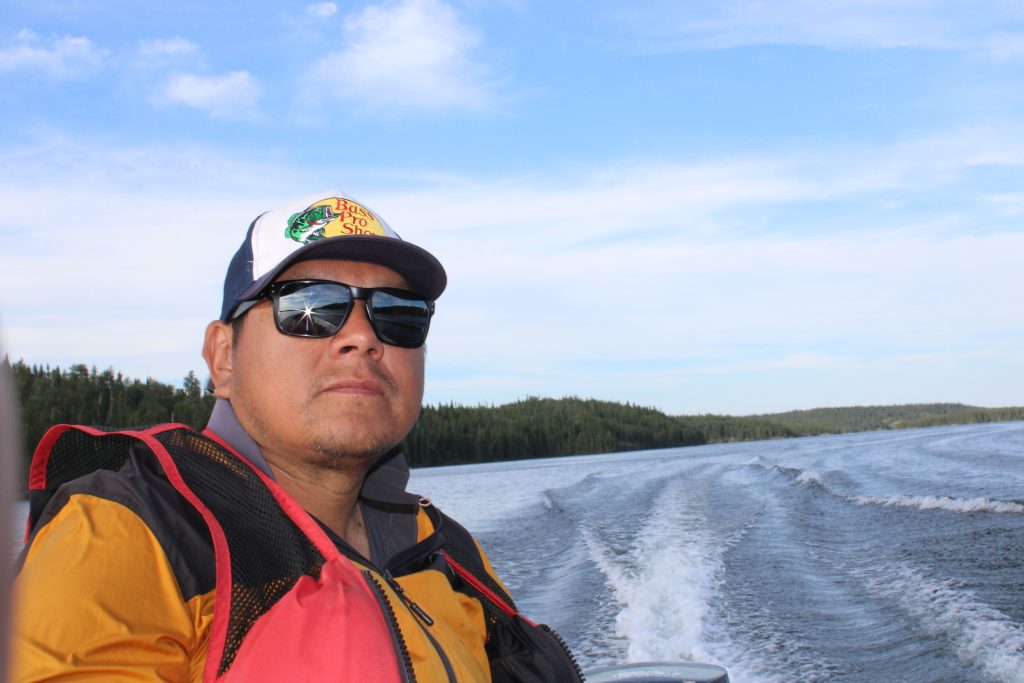
Award-winning master’s student researches Indigenous language revitalization using video-chat technology
William (Bill) Cook (MEd’22) was recently awarded one of two Spring 2022 Associate Dean’s Graduate Student Thesis Awards. Bill is from wapâtikwaciwanohk (Southend, Reindeer Lake) Saskatchewan. He is currently an Assistant Professor at Brandon University in Manitoba. Bill has a BA in Cree Language Studies from the First Nations University of Canada and has taught Cree language at all levels for over 20 years. Bill’s award-winning thesis is entitled, “Indigenous Language Revitalization: Connecting Distant Cree Language Learners With Cree Language Speakers Using Video-Chat Technology.” The following is a Q & A with Bill about his research story:
Q & A with Bill Cook
Why did you chose to do your master’s degree (thesis route)?
I chose the thesis route because when I started considering doing my masters, I was told by a few people that if I were considering doing a PhD program after my masters, then going the thesis route would be beneficial to getting into PhD programs. For me, doing a thesis was much more beneficial than I thought. It taught me how to do a study, how to collect data, how to work with people as participants and co-researchers, and I learned some different methodologies both Indigenous and non-Indigenous on how to approach research. I feel that going this route prepared me to be a better researcher.
Why did you choose the U of R?
I was a Cree sessional instructor at the First Nations University when I met Dr. Andrea Sterzuk. She had taken a couple of Cree courses that I taught. I had inquired about an EdTech grad program and Andrea mentioned a master’s program through the University of Regina’s Faculty of Education called Curriculum and Instruction, which included EdTech courses that interested me. She thought this would be a good fit. I agreed. I applied for the program and the Faculty of Graduate Studies and Research and the Education Research and Graduate Programs offices were so helpful to me during this process. It also allowed for me to continue working close to home.
What were the circumstances that led to your research thesis topic?
My research topic was Indigenous Language Revitalization: Connecting Distant Cree Language Learners with Cree Language Speakers Using Video-Chat Technology. This topic was an easy choice for me to decide on. I have been teaching the Cree language for over 20 years at all levels of education from instructing kindergarten students to university courses. One question I have been asked by many language learners throughout the years has been “What do I do next to become fluent in the language?” and my answer is always to immerse themselves in the language and, if possible, to move into a community that predominantly speaks the target language. Most times, language learners are not able to move to those locations, which are typically First Nations communities. By identifying that distance was the barrier, I wanted to see if using technology to make these connections would be beneficial in language learning and also if this could be an option to anyone from anywhere for Cree speaking practice.
How did this topic become important to you?
I believe the work in Cree language revitalization is very important work. If we ever lose our Indigenous languages in this country of Canada then where do we go to learn them? This is our home, our land. Our Indigenous cultures, languages, traditions, identities stem from this land; the land is our language. This is all we have, we have nothing else, we can’t go anywhere else. We have a responsibility to reclaim, revitalize, preserve, and maintain our Indigenous languages.
What were your research findings?
In doing my research I found that having regular synchronous video-chats were effective in remote language learning in both language and culture. Fluent speakers can share their language and culture just by being themselves from wherever there is Internet access. Also, when working with non-tech savvy participants, you must assist with the technology or else find them someone they are comfortable with to assist them. Laughter was a dominant factor throughout the daily virtual conversations, having fun with your project is a good thing. It was enjoyable to see everyone getting more comfortable with speaking in Cree as much as they could. Video-chat technology is a good tool for connecting grandparent with grandchild; this grandparent/grandchild pair in my study made bannock in real-time while repeating Cree words of the process. (See video below).
What impacted you most about your findings?
What impacted me the most was that once the connections were made, the conversations began to flow naturally. The project began a life of its own and seemed to have a spirit of its own. The participants were able to adapt to technology. I am so grateful to all my participants for their work. The relationships built during this process allowed for the conversations to happen naturally. I wondered if the participants not being face-to-face would be able to achieve this connection and I was impressed that it had.
What was the highlight during the process?
The highlight for me was to get to do my study in my hometown and spend time with my family back home in Southend was a bonus. It reminded me of my childhood, growing up and doing things like netting, plucking ducks, filleting fish, making bannock, and cooking on an open fire. Another highlight was watching my participants, especially my parents, gaining confidence in using the tech tools. Lastly, hearing the Cree language being spoken between the learner and speaker was enjoyable to observe.
What recommendations did you make based on your research findings?
The recommendations I developed were:
- The use of video-chat technology as a language learning tool is only one way to share language and culture.
- Investing in tech tools that fit your language learning style is a good investment.
- Finding ways to employ fluent speakers to share their language and culture using technology is a good step towards revitalizing, preserving, and maintaining language.
- If you don’t know the protocols of the area then ask; there is nothing wrong with asking.
- For communities: they can find ways to employ their fluent speakers within their organizations, training community members in technology-based language platforms is a good investment.
- For schools, universities, and other organizations: they can help in Indigenous language and culture revitalization by incorporating fluent speakers and knowledge keepers within their education systems.
What do you hope will be the outcomes of your research?
I hope to see more opportunities like this study. When the pandemic hit everyone went online to spend time with each other, communicate, and speak, in all languages. I think I have reached an outcome of seeing more people using video-chat tech to communicate and practice language learning. Today, I see many platforms for Indigenous language learning. I hope people continue and grow.
What are your future plans?
My future plans are to continue working in Indigenous language and culture revitalization. I recently got accepted to the Hawaiian and Indigenous Language and Culture Revitalization Doctorate Program at the University of Hawaii in Hilo. I look forward to where that opportunity takes my work. I would like to create employment for fluent Indigenous language speakers with or without having Western education degrees/certificates. This is URGENT to do, as we are losing fluent speakers daily and many of them are not certified to teach in a Western setting. Why do we have to wait for fluent Indigenous language speakers to get certified to pass on their languages? I believe there is a way to incorporate and employ fluent language speakers into Indigenous language programs and courses. I am currently an Assistant Professor at Brandon University. There I will continue teaching the Cree language, creating opportunities for other Indigenous languages, and continued service work in the community and online. I have also been offering a weekly Cree speaking practice group called ‘The Cree Group’ using video-chat. We can be found through Facebook. My work continues with Indigenous languages and cultures using different platforms of technology.
What have been your experiences in the First Nations University of Canada and the University of Regina?
The First Nations University and the University of Regina were both supportive during my studies. All the professors and classmates made my experience enjoyable. The atmosphere was welcoming and I felt at home in these spaces. I give credit to the instructors for being so helpful. There were many opportunities to help me along the way which included study groups, writing groups, financial funding and other support systems that played a role in my success. I am thankful for that.
Who were your influences in deciding on a career in the field of education?
I have to give credit to my late brother and mentor Darren Okemaysim kakî-itît for influencing me in my career in teaching the Cree language. He was my teacher; I took many classes from him. He was my mentor, and gave me the opportunity to teach classes alongside him. He always encouraged me to speak the Cree language, rarely did we ever speak English to each other. He once told me “If you continue your work in the Cree language, you will never go wrong” and he was right. Also, my wife and parents are always supportive and influential of what I do. I feel I am on the right path; this is what I am meant to do. There is lots of work to be done in Indigenous language and culture revitalization.
________________________
Links to Bill’s ongoing Cree language and culture work:
Facebook Group page (announcements) https://www.facebook.com/groups/1422458251268465
Bill’s Website where you can sign up for the Cree Group events: https://www.creeclass.com/
